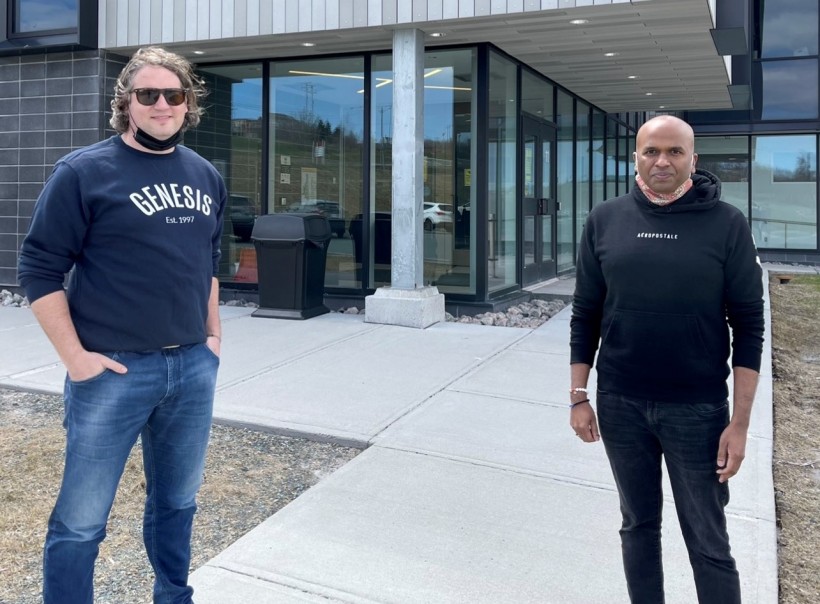St. John’s-based disinfectant maker Polyamyna Nanotech has inked a deal with Eastern Health to run clinical trials of its product once it receives Health Canada approval.
Polyamyna, which graduated from the Genesis Evolution program in January, says its disinfectant has been proven by third-party testing to kill antimicrobial-resistant pathogens, sometimes called “superbugs.” It can be used to coat surfaces, reducing the need for reapplications.
“Our main focus is to build a new antimicrobial technology to counter superbugs, because right now, we are seeing a variety of superbugs,” said CTO Bala Gorityala in an interview. “We have been trying to design and come up with innovative antimicrobial technologies, which could address existing hospital-acquired infections and existing pandemics.”
Polyamyna is part of a new generation of health-tech startups in Newfoundland and Labrador. These include such Genesis companies as: venture capital-backed BreatheSuite, whose technology helps people to use inhalers properly; Granville Biomedical, whose swab for COVID tests was recently approved by Health Canada; and Unbound Chemicals, which aims to reduce waste from drug manufacturing.
Gorityala, who has a PhD in glycochemistry and nanotechnology from Singapore’s Nanyang Technological University, co-founded Polyamyna in 2017 with CEO Ramesh Kumar Mani, who holds a PhD in physical chemistry from Memorial University. They graduated from Genesis’s Evolution incubator in January.
Its flagship product, Keep Klear, creates a thin coating that kills bacteria, viruses and fungi on both hard and porous surfaces. The coating can survive being wiped down with detergent as many as 1,000 times before it needs to be reapplied, according to Polyamyna’s website.
The company also makes two other sprays, Micro Dome and Vanish All, which have similar antimicrobial properties, but are not as long-lasting.
Vice-President of Sales Robb Hoyles said the three sprays are meant for use in a wide range of settings, from private homes to hospitals to public transit. He added that Polyamyna could save its corporate clients money by reducing their cleaning costs.
To help explain its technology to potential buyers and backers, Polyamyna has also created a YouTube channel, where it posts videos explaining how its products work.
ACOA Lends $492K to Medtech Company Audioptics
Keep Klear can be especially valuable to hospitals as about one in nine hospital patients will pick up a new infection during their stay, according to the Provincial Infection Control Network of British Columbia.
The trial with Eastern Health, the largest health authority in Newfoundland and Labrador, is set to last for about six months.
The Health Canada approval currently in the works will be doubly important, Hoyles said, because it will also validate Polyamyna’s technology in the eyes of international buyers.
The company is eyeing the Middle East market, particularly the United Arab Emirates, which has a government-funded health sector worth about US$15.5 billion annually.
India, where a quarter of all hospital visits lead to the patient acquiring a new infection, will also be a crucial market, Hoyles said. So crucial, in fact, that Polyamyna has a manufacturing facility there, which will operate in tandem with its Canadian factory and save the company the cost of shipping product to South Asia.
Polyamyna has 10 or 11 employees, Hoyles said, split between its offices in St. John’s and Chennai, India. The company plans to hire several more chemists once it begins to scale up production, and move its Canadian manufacturing from Memorial University’s Marine Institute to a dedicated facility.
It has also raised pre-seed funding, although Hoyles declined to share the dollar value, buttressed by financial support from ACOA, NRC-IRAP and Newfoundland’s Department of Industry, Energy and Technology.
“We are actively engaging with the potential for investment,” said Hoyles. “And we're actively seeking industry partners globally right now. But more so right now, we're actually focusing on trying to find strategic partnerships within medium-to-large sized businesses in Atlantic Canada, as there are many value-added potentials for different products.”










